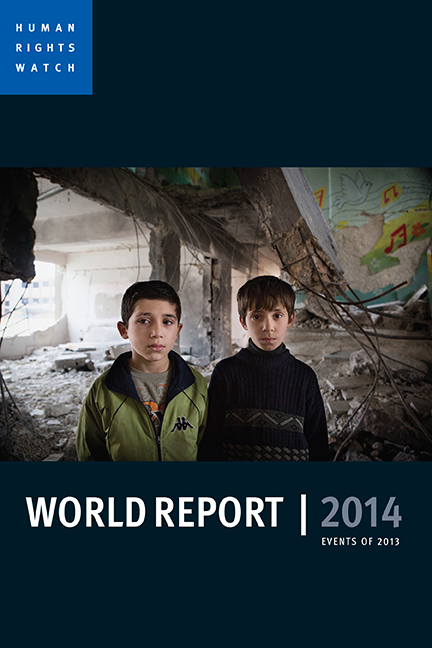Book contents
- Frontmatter
- Dedication
- HUMAN RIGHTS WATCH
- Table of Contents
- Foreword
- Rights Struggles of 2013: Stopping Mass Atrocities, Majority Bullying, and Abusive Counterterrorism
- The Human Rights Case for Drug Reform How Drug Criminalization Destroys Lives, Feeds Abuses, and Subverts the Rule of Law
- Putting Development to Rights: Integrating Rights into a Post-2015 Agenda
- The Right Whose Time Has Come (Again) Privacy in the Age of Surveillance
- Photo Essays
- AFRICA
- AMERICAS
- ASIA
- EUROPE AND CENTRAL ASIA
- MIDDLE EAST AND NORTH AFRICA
- UNITED STATES AND CANADA
- 2013 HUMAN RIGHTS WATCH PUBLICATIONS
- Acknowledgments
Putting Development to Rights: Integrating Rights into a Post-2015 Agenda
Published online by Cambridge University Press: 07 May 2022
- Frontmatter
- Dedication
- HUMAN RIGHTS WATCH
- Table of Contents
- Foreword
- Rights Struggles of 2013: Stopping Mass Atrocities, Majority Bullying, and Abusive Counterterrorism
- The Human Rights Case for Drug Reform How Drug Criminalization Destroys Lives, Feeds Abuses, and Subverts the Rule of Law
- Putting Development to Rights: Integrating Rights into a Post-2015 Agenda
- The Right Whose Time Has Come (Again) Privacy in the Age of Surveillance
- Photo Essays
- AFRICA
- AMERICAS
- ASIA
- EUROPE AND CENTRAL ASIA
- MIDDLE EAST AND NORTH AFRICA
- UNITED STATES AND CANADA
- 2013 HUMAN RIGHTS WATCH PUBLICATIONS
- Acknowledgments
Summary
Before Tunisia's popular uprising erupted in late 2010, many in the international community saw the country as a development success story. Economic growth was close to 4 percent, 9 in 10 children went to primary school, and life expectancy was an impressive 75 years.
But for many Tunisians this progress was clearly not enough: higher incomes and better access to services did not compensate for the ills and costs of corruption, repression, inequality, and powerlessness. Nor did it satisfy aspirations for greater justice, freedom, and dignity. In January 2011, popular protests ousted Zine el-Abidine Ben Ali from the presidency after 23 years in power.
While Tunisia's struggle for rights-respecting democracy continues, its recent experience exposes the narrowness and inadequacy of many existing approaches to development. It also provides a compelling case for development to be reframed more broadly, not just as higher income (important as this is), but as the creation of conditions in which people everywhere can get an education, visit a doctor, and drink clean water, and also express themselves freely, be protected by a fair and accessible justice system, participate in decision-making, and live free of abuse and discrimination. These are some of the basic economic, social, cultural, civil, and political rights that governments are obligated to honor but deny to hundreds of millions of people.
Many of those who are most impoverished belong to society's most marginalized and vulnerable social groups—women, children, people with disabilities, ethnic minorities, people infected with HIV—who often lack the power, social or legal standing, or access to decision-making that allows them to challenge their disadvantaged status or improve their circumstances.
For the most part, development policy and programs have ignored the critical interdependence of economic and social rights with civil and political rights, and so have failed to challenge systemic patterns of discrimination and disadvantage that keep people in poverty. As a result, many poor people have been excluded, or have failed to benefit, from development programs. More disturbingly still, people have been harmed by abusive policies carried out in the name of development: forced from their land to make way for large commercial investors, compelled to toil long days for low pay in dangerous and exploitative conditions, or exposed to life-threatening pollution from poorly regulated industries.
- Type
- Chapter
- Information
- World Report 2014Events of 2013, pp. 29 - 40Publisher: Bristol University PressPrint publication year: 2014

